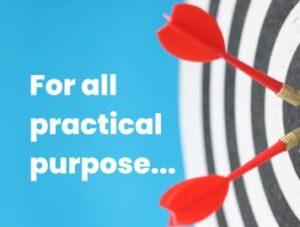I became sick and tired of being urged to get to the point when I speak. My family, my coach, my boss, my improv instructor, and recently an irritated vendor have all done it. Expressed in different ways, the impatience is palpable. From shifting uncomfortably or eye-rolling while I speak, to actually yelling ‘get to the f**king point”. For a sensitive little girl who used to set up a story-telling booth at home and charge 50 paise (that’s like 1 cent) for ‘make up stories’, I felt hurt and anxious that they seem to be asking me to demonstrate a skill for which I lacked ability. Deep down, I know all of them love me, but that didn’t stop me from feeling less capable in conversations I’m participating. “No one should make me feel this way” I thought, defensively. I didn’t feel comfortable leaving out any details, so I just tried to speak faster.
I notice I don’t do this with acquaintances, clients when they’re speaking (because a session is all about them) or any one I’m trying to impress with my armored face. So, I thought, then with whom do I do it and why? I monologue mainly around people with whom I’m extremely comfortable being vulnerable or whom I genuinely believe want to know what I have to say. I have also noticed that I feel the need to overexplain not because I consider the other person unintelligent, but because of my deep phobia of being judged for not thinking through an idea or problem enough. I deliberately changed my perspective by asking how this way of speaking or writing can be advantageous without being stifling for the other person. Here are some harsh truths and good news.
Recognizing the condition is deeper than you think
The painful truth is that I suffer from perfectionism. So many like me are afflicted with a debilitating paradox. In their book ‘When Perfect isn’t Good enough‘ with its 291 pages of strategies for coping with perfectionism (I counted), Martin Anthony, Ph.D and Richard P. Swinson, MD show how perfectionism is a very real, often ignored facet of mental health which loses out to its more glamourous relatives- depression and anxiety. Ironically, both these conditions are often the result of holding ones self to impossibly high standards.
The stream of consciousness thinking reflects that people who are perfectionistic with respect to speaking are often very self – conscious about how we speak or saying the wrong thing.
While I am no where close to handing myself 5 stars for being Ms. Brevity, I did set a clear intention for achieving it when I owned up to the fact that this is my challenge to overcome. Taking accountability is the first step.
Next, stream of consciousness thinking is not a bad thing. In private.
It is akin to crying, or completely bearing your soul to your most trusted friend and, in this case, the trusted friend is you
I realized that the one person I trust who doesn’t roll their eyes at me (at least overtly) is my therapist. So, with an intention to genuinely scintillate the world with brevity, I thought about what I could learn from a therapy session. To process what I talk about in a session, I follow the process of ‘stream of consciousness writing‘ as a way to help articulate my thoughts. For those unfamiliar with the term, its writing in a state of flow without censoring a single thought with a timer to keep you in check. You are able to distill key ideas, themes or faulty beliefs through this process, which in turn can help set healthy perspective in areas where you feel stuck. It sort of sounds like I do the same thing when I speak, especially when stuck, distressed or sad. I’m just that kind of person. So, I experimented with trying this technique beyond therapy, before I take a verbal dump on my loved ones.
Carry a journal do a 5 minute focused stream of consciousness writing or dictate thoughts into your phone for an uninterrupted timeframe, especially when agitated, sad or overwhelmed. Ill wager that this won’t help you in improv class when someone is waiting for you to give them a line in 5 seconds, but, it will help to create a muscle to start articulating the idea and themes quicker for yourself. Perhaps there is hope for me in improv after all.

Next, believe that you are interesting and sharp
I inherently believe that I’m uninteresting. This is the most difficult part of this process to confront, and I’m not there yet. My imposter is always chiding me with ways of believing that what I have to say is just not good enough to sustain anyone’s interest. I’m working on changing that in unconventional ways. I dance to really funky and edgy music and imagine myself like a rock star sometimes I have shameful proof of this on my instagram page. I stand by myself in front of the mirror and show myself how bad ass I am. Certain metaphors do it for me as well; a neat and clean desk reflects an uncluttered mind.
Last, prioritizing my relationships
I am deeply aware of the patience my inner circle has to extend to me when I monologue. It’s very taxing on them. I don’t wish for my condition to be their problem. When I look at it this way, I feel less resentful of their reactions and more purposeful about being succinct.
No one has ever told me I’m dull and boring and my work or problem solving is slovenly, so why am I?
All I ask is for the gentle consideration for those who don’t think in stream of consciousness mode that you cut the perfectionists in your life some slack. Yes, we will always tend to veer to the side of clarifying, sending the extra email, overexplaining, asking multiple questions. But we also do bring excellence to many parts of your life by our strategic grasp of subject matter and deep resourcefulness which can be a personal and professional asset. But we promise not to redo your thoughts and restate it in our words, twice, again. But, just to re-state what you just thought….
P.S.
If you are really great at what you do, but the overachiever in you is holding you back from parts of your life where your heart’s invested; a project, navigating a life transition or a goal, or you seek better decision making skills to create movement and stop procrastinating or more self awareness in difficult relationships so that you can reclaim your time, energy and joy, talk to me. I feel you. I know you. I am you. We may be able to work together to help you get there.








